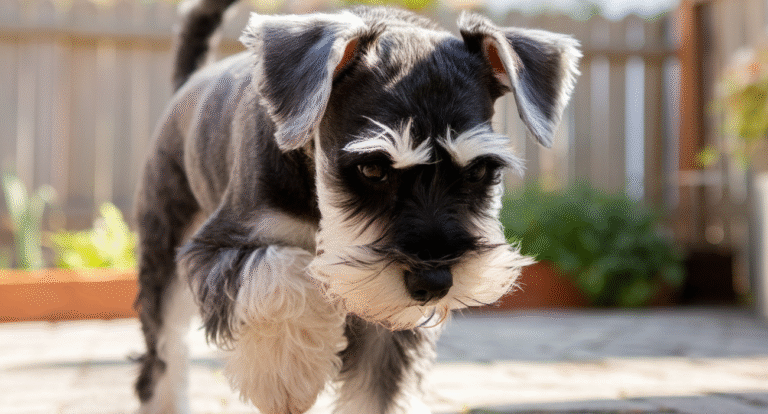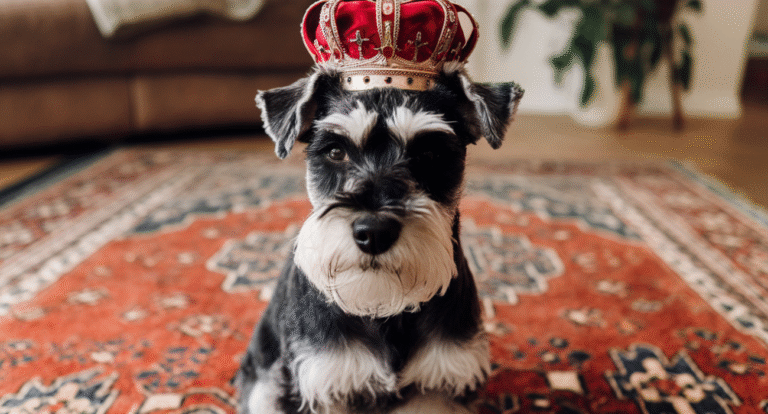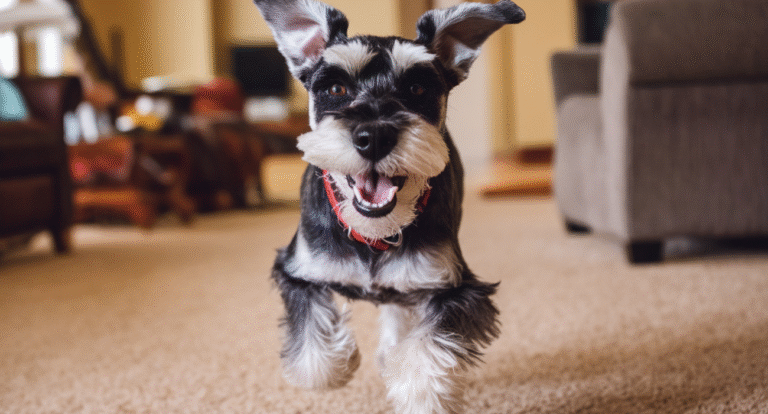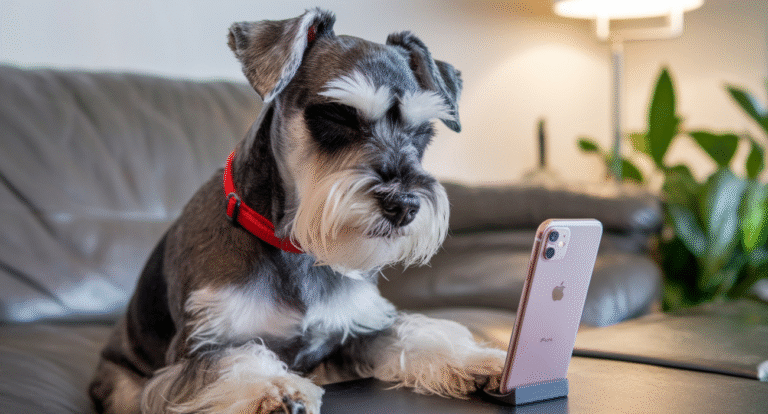Even the most loving schnauzer parents make these errors. The good news? They’re super easy to avoid once you know what they are!
Owning a Miniature Schnauzer feels like living with a pint-sized comedian who has endless energy and a personality twice their size. They are smart, affectionate, and full of sass, but they also have quirks that can trip up even the most devoted owner. To keep your Schnauzer happy and healthy while avoiding unnecessary headaches, here are fifteen common mistakes Schnauzer parents make and how you can steer clear of them.
1. Skipping Regular Grooming
Miniature Schnauzers sport those iconic wiry coats that demand respect and regular maintenance. Think of their fur like a vintage sports car, gorgeous when properly maintained, but a nightmare when neglected. Skipping trims and brushing sessions leads to painful mats that can trap dirt, moisture, and even cause skin infections.
The key is consistency. Weekly brushing sessions keep their coat healthy, while professional grooming every 6-8 weeks maintains that classic Schnauzer silhouette. Your groomer will handle the intricate work of hand-stripping or clipping, ensuring your pup looks sharp and feels comfortable.
Regular grooming isn’t vanity, it’s a health necessity that prevents painful matting and allows you to spot potential skin issues early.
2. Ignoring Their Exercise Needs
Don’t let that compact frame fool you, Miniature Schnauzers pack the energy of a much larger dog into their petite bodies. Originally bred as ratting dogs and farm companions, they’re hardwired for activity and purpose. A sedentary Schnauzer becomes a destructive Schnauzer faster than you can say “chewed shoe.”
Daily exercise should include at least 30-45 minutes of activity split between walks, fetch sessions, and interactive play. These aren’t lap dogs content to lounge all day, they need jobs to do and energy to burn.
3. Forgetting Mental Stimulation
Physical exercise alone won’t cut it with these brainy little dynamos. Schnauzers ranked 12th in Stanley Coren’s “The Intelligence of Dogs,” and that intelligence needs an outlet. A bored Schnauzer becomes an inventive problem-solver, often creating “entertainment” that involves your favorite belongings.
Mental enrichment activities include:
- Puzzle feeders and treat-dispensing toys
- Hide-and-seek games with treats or toys
- Basic obedience training sessions
- Scent work and nose games
- Rotation of toys to maintain novelty
The Boredom Breakdown
| Activity Level | Mental Stimulation | Behavioral Outcome |
|---|---|---|
| High | High | Happy, well-behaved Schnauzer |
| High | Low | Anxious, potentially destructive |
| Low | High | Restless but manageable |
| Low | Low | Behavioral disaster waiting to happen |
4. Overfeeding Treats
Those expressive eyebrows and pleading stares could melt the hardest heart, making it nearly impossible to resist slipping them extra treats. However, Schnauzers have slower metabolisms than many breeds and can pack on pounds quickly. Excess weight stresses their joints and increases risks for diabetes and pancreatitis.
Treats should comprise no more than 10% of their daily caloric intake. Get creative with healthy alternatives like small pieces of carrots, green beans, or even ice cubes. Better yet, use portions of their regular kibble as training rewards, they’ll be just as motivated, and you’ll maintain better portion control.
5. Neglecting Dental Care
Miniature Schnauzers face higher risks for dental problems than many breeds, with periodontal disease affecting up to 80% of dogs by age three. Poor dental hygiene leads to more than bad breath, bacteria from infected gums can travel through the bloodstream and damage vital organs.
Start a dental routine early with puppy-safe toothpaste and finger brushes, gradually working up to regular toothbrushes. Daily brushing is ideal, but even three times weekly makes a significant difference. Dental chews, water additives, and professional cleanings complete a comprehensive oral care program.
6. Allowing Excessive Barking
Schnauzers were bred to be alert watchdogs, and boy, do they take that job seriously! While some barking is natural and even desirable, excessive vocalization can strain relationships with neighbors and indicate underlying anxiety or boredom.
The mistake many owners make is accidentally rewarding the behavior. Rushing to comfort a barking dog or giving treats to quiet them teaches that noise equals attention. Instead, ignore attention-seeking barks and reward quiet behavior with praise and treats.
Training a Schnauzer to bark on command paradoxically helps them learn when NOT to bark, it puts you in control of their vocal expressions.
7. Skipping Socialization
Proper socialization creates confident, well-adjusted dogs, while inadequate exposure produces fearful or overly protective pets. Schnauzers can become suspicious of strangers and reactive to new situations without early, positive experiences.
The critical socialization period extends from 3-14 weeks, but learning continues throughout their lives. Expose your Schnauzer to various people, animals, environments, sounds, and experiences during this window. Puppy classes, controlled playdates, and supervised outings build confidence and social skills.
8. Forgetting Regular Vet Checkups
Schnauzers may appear robust, but they’re predisposed to several health conditions that benefit from early detection. Regular veterinary examinations catch problems before they become serious, expensive, or irreversible.
Common Schnauzer health concerns include:
- Pancreatitis
- Diabetes
- Eye problems (cataracts, progressive retinal atrophy)
- Bladder stones
- Heart conditions
- Skin allergies
Annual wellness exams for young adults and bi-annual checkups for seniors help maintain optimal health throughout their 12-15 year lifespan.
9. Not Managing Their Stubborn Streak
Intelligence and independence make Schnauzers excellent problem-solvers but challenging students. They’re not blindly obedient like some breeds, they evaluate commands and decide whether compliance serves their interests. This selective hearing frustrates owners who expect immediate obedience.
Consistency is crucial when dealing with Schnauzer stubbornness. Mixed messages or sporadic enforcement teaches them that rules are optional. Use positive reinforcement techniques, make training sessions engaging, and establish yourself as a fair but firm leader.
Training Tips for Strong-Willed Schnauzers
Successful training requires:
- Short, frequent sessions (5-10 minutes)
- High-value rewards for motivation
- Consistency across all family members
- Patience and persistence
- Creative approaches to maintain interest
10. Overlooking Their Weight
Schnauzers typically weigh between 11-20 pounds, and their compact build makes even small weight gains obvious. Extra pounds stress joints, worsen breathing problems, and increase disease risks. Yet many owners struggle to assess their pet’s body condition accurately.
You should be able to feel your Schnauzer’s ribs with gentle pressure and observe a visible waist when viewed from above. If you can’t feel ribs easily or notice a rounded appearance, it’s time to reassess diet and exercise routines.
11. Skipping Heartworm and Flea Prevention
Even primarily indoor Schnauzers face parasite risks. Mosquitoes carrying heartworm larvae can enter homes, while fleas hitchhike on clothing and other pets. These parasites cause serious health problems and expensive treatments.
Year-round prevention is more cost-effective than treatment. Modern preventatives often combine heartworm, flea, and tick protection in convenient monthly doses. Consult your veterinarian about the best options for your area’s specific risks.
12. Not Providing a Secure Yard
Schnauzers possess natural curiosity and surprising athleticism. They can dig under fences, squeeze through gaps, or even climb barriers when motivated. An unsecured yard creates opportunities for dangerous escapes and neighborhood adventures.
Fence requirements should include:
- Minimum 4-foot height
- Buried barrier or concrete footer to prevent digging
- Gap inspection for potential squeeze-through spots
- Regular maintenance to prevent deterioration
- Secure gate latches that curious paws can’t manipulate
13. Underestimating Their Grooming Expenses
Professional Schnauzer grooming costs significantly more than basic wash-and-dry services. Their specialized coat requires skilled techniques like hand-stripping or precise clipper work to maintain the proper texture and appearance.
Budget $75-150 per grooming session every 6-8 weeks, with costs varying by location and service level. Learning basic maintenance skills like nail trimming, ear cleaning, and sanitary area clipping can reduce professional visits and overall expenses.
14. Ignoring Early Training
Puppy brains are like sponges, they absorb lessons incredibly quickly during their early months. Waiting until behavioral problems develop makes training much more challenging and time-consuming. Bad habits that seem cute in puppies become annoying or even dangerous in adult dogs.
Start basic training immediately upon bringing your Schnauzer home. House training, crate training, basic commands, and leash manners form the foundation for a well-behaved companion. Early training sessions also strengthen your bond and establish communication patterns that last a lifetime.
15. Forgetting to Enjoy Their Quirky Side
In the midst of training schedules, grooming appointments, and health maintenance, it’s easy to forget why you fell in love with Schnauzers in the first place. While avoiding mistakes is important, don’t let perfectionism overshadow the joy these spirited companions bring to daily life.
Embrace their theatrical personalities, laugh at their dignified expressions, and appreciate their unwavering loyalty. Schnauzers are natural entertainers who thrive on interaction and shared adventures. The relationship you build through play and companionship often matters more than perfect obedience.
The goal isn’t to eliminate every quirk and challenge, it’s to channel your Schnauzer’s natural traits into positive behaviors while celebrating what makes them uniquely wonderful.
Ready to Schnauzer-Proof Your Life?
Every dog owner makes mistakes, but awareness gives you a significant advantage in avoiding common pitfalls. Miniature Schnauzers reward thoughtful, consistent care with years of companionship, entertainment, and unconditional love. Armed with this knowledge and a healthy sense of humor, you’re ready to navigate the wonderful world of Schnauzer ownership with confidence and joy.






